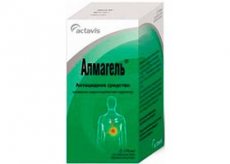Medical expert of the article
New publications
Preparations
Almagel
Last reviewed: 03.07.2025

All iLive content is medically reviewed or fact checked to ensure as much factual accuracy as possible.
We have strict sourcing guidelines and only link to reputable media sites, academic research institutions and, whenever possible, medically peer reviewed studies. Note that the numbers in parentheses ([1], [2], etc.) are clickable links to these studies.
If you feel that any of our content is inaccurate, out-of-date, or otherwise questionable, please select it and press Ctrl + Enter.

Almagel is an antacid drug. Among its functions is the neutralization of gastric juice secreted by the body. The drug reduces the level of hydrochloric acid in the gastric juice to the optimal required values. Almagel has a local anesthetic effect, and in addition, a choleretic and slight ruminatory effect.
Indications Almagel
The medicine is recommended for use in:
- Acute gastritis with high acidity;
- Ulcer of the duodenum or stomach (in the acute stage);
- Esophagitis;
- Food poisoning;
- Enteritis and duodenitis;
- Hiatal hernia;
- Flatulence;
- Discomfort or pain in the abdominal area due to dietary irregularities, alcohol or drug overdose, or high doses of caffeine and nicotine.
The drug can be taken as a preventative measure – to prevent the development of ulcers as a result of taking glucocorticosteroids or non-steroidal drugs that have an anti-inflammatory effect.
Release form
Almagel is available in 170 or 200 ml bottles.
Pharmacodynamics
The drug is evenly distributed over the gastric mucosa. Thus, the medicine provides long-term gastroprotection. Its functions also include buffering and antacid - the concentration of acid in the gastric juice between doses of the drug is maintained within 4-4.5 / 3.5-3.8. Thanks to sorbitol, a mild laxative and choleretic effect is performed. The therapeutic effect of the drug appears 3-5 minutes after administration and lasts for 70 minutes.
Pharmacokinetics
It is almost not absorbed from the gastrointestinal tract.
Dosing and administration
The medicine is taken orally; the bottle with the contents must be shaken before use.
Dosage for adults: 1-2 teaspoons half an hour before meals and before bedtime. If the desired effect cannot be achieved, it is recommended to increase the dose to 3 teaspoons. A maximum of 16 teaspoons of the medicine can be taken per day. When taking Almagel in maximum doses, treatment cannot be carried out for more than 2 weeks.
Children under 10 years of age are prescribed a third of the adult dose; children 10-15 years of age – half.
 [ 7 ]
[ 7 ]
Use Almagel during pregnancy
During pregnancy, it is prohibited to take the medicine for more than 3 days. It is not recommended to use during lactation.
Contraindications
It is prohibited to use Almagel in the following cases:
- In severe kidney diseases;
- For Alzheimer's disease;
- If there is high sensitivity to the elements of the drug;
- Infants up to 1 month.
Side effects Almagel
Side effects include constipation, nausea and vomiting, abdominal cramping, and taste disturbances. In some cases, drowsiness. Long-term use of Almagel can cause osteomalacia in a patient who eats food with a low phosphorus content and who is predisposed to developing calcium-phosphorus metabolism disorders.
 [ 6 ]
[ 6 ]
Overdose
Symptoms of an overdose of the suspension include the following signs:
- fatigue;
- facial flushing;
- exhaustion; muscle weakness;
- muscle numbness; muscle pain;
- inappropriate behavior;
- mental disorder;
- mood swings; nervousness;
- slow breathing;
- sensation of an unpleasant taste.
To eliminate an overdose, it is necessary to first remove the remains of the drug from the body. To do this, wash the stomach, stimulate vomiting, give sorbents and a laxative.
Interactions with other drugs
Benzocaine is prohibited to be used in combination with sulfonamides (as they are antagonists of the antibacterial effect).
In combination with ketoconazole, cardiac glycosides, iron-containing agents, tetracyclines, ionazid, antihistamines, ciprofloxacin, cimetidine, phenothiazine, and rhinitildine, Almagel creates insoluble compounds, due to which the absorption of these medications becomes less.
Storage conditions
The medicine should be kept at a maximum temperature of 25°C in a dry place. Almagel must not be frozen.
Shelf life
The medicine should be kept at a maximum temperature of 25°C in a dry place. Almagel must not be frozen.
Attention!
To simplify the perception of information, this instruction for use of the drug "Almagel" translated and presented in a special form on the basis of the official instructions for medical use of the drug. Before use read the annotation that came directly to medicines.
Description provided for informational purposes and is not a guide to self-healing. The need for this drug, the purpose of the treatment regimen, methods and dose of the drug is determined solely by the attending physician. Self-medication is dangerous for your health.

